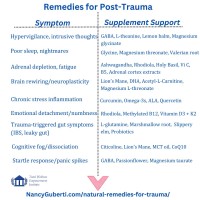
Trauma can leave an invisible imprint on the body and mind long after the triggering event has passed. Whether the trauma was physical, emotional, or psychological, the body remembers. Survivors of trauma often experience heightened anxiety, chronic stress, dissociation, insomnia, digestive issues, mood instability, and immune dysregulation. Addressing trauma is a layered journey—and while therapy, somatic work, EMDR, and nervous system regulation are central, supplements can play a powerful supportive role.
The physiological impact of trauma is profound. When someone experiences trauma, their autonomic nervous system becomes dysregulated. They may become stuck in sympathetic hyperarousal (fight or flight) or parasympathetic freeze (shutdown). Over time, this can lead to HPA axis dysfunction (adrenal burnout), neurotransmitter depletion, impaired methylation, inflammation, and altered gut-brain communication.
Let’s explore how targeted supplementation can support post-trauma recovery by calming the nervous system, stabilizing mood, reducing inflammation, and helping the body feel safe again.
Supplements for Post-Trauma
Symptom or Healing Goal Recommended Supplements
Hypervigilance L-theanine, GABA, Holy Basil, Passionflower
Sleep disturbances or nightmares Glycine, Magnesium threonate, Melatonin, Lemon Balm
Dissociation or emotional numbing Rhodiola, SAMe, Acetyl-L-Carnitine, Mucuna Pruriens
Emotional flashbacks Inositol, GABA, Ashwagandha, Vitamin B6
Chronic fatigue CoQ10, NAD+, B-complex, Rhodiola, Cordyceps
Digestive issues Probiotics, L-Glutamine, DGL licorice, Zinc carnosine
Inflammation from trauma Curcumin, Omega-3s, Resveratrol, Boswellia
Adrenal dysregulation Licorice root, Phosphatidylserine, Adrenal glandulars, Vitamin C
Emotional resilience Magnesium glycinate, L-theanine, 5-HTP, Methylated B-vitamins
Rebuilding neurotransmitters Tyrosine, Tryptophan, Methyl-B12, P5P (B6), Folate (5-MTHF)
Understanding Trauma from a Functional Medicine Lens
Trauma alters brain function—especially in regions like the amygdala (fear processing), hippocampus (memory), and prefrontal cortex (decision making). This creates a loop where the brain continually scans for danger, even when none is present. This causes overactivation of the hypothalamic-pituitary-adrenal (HPA) axis and depletion of critical neurotransmitters like serotonin, dopamine, and GABA.
The gut-brain axis is also deeply affected. Trauma can disrupt digestion, impair nutrient absorption, and trigger gut permeability (“leaky gut”), which leads to systemic inflammation.
Addressing both the brain and the gut is key to restoring post-trauma health.
Key Supplements to Consider for Post-Trauma Healing
L-Theanine – This calming amino acid helps buffer the overstimulation common in post-traumatic states. It increases alpha brain waves and supports calm alertness.
GABA (Gamma-Aminobutyric Acid) – GABA is essential for reducing neuronal excitability and panic symptoms. Supplementation can support the inhibitory tone needed to decrease anxiety and startle response.
Magnesium Threonate – This form of magnesium crosses the blood-brain barrier and helps regulate mood, cognition, and sleep. Many trauma survivors are magnesium-deficient.
Rhodiola Rosea – As a stress-adaptogen, Rhodiola is helpful for rebuilding resilience and restoring energy without overstimulation. It supports balanced cortisol levels.
Acetyl-L-Carnitine (ALCAR) – Especially beneficial for dissociation, brain fog, and fatigue, ALCAR helps restore mitochondrial function and enhance mood regulation.
SAMe and Methylated B Vitamins – These nutrients support methylation, a process crucial for detoxification, neurotransmitter synthesis, and DNA repair—all of which are often impaired post-trauma.
5-HTP and L-Tryptophan – These precursors to serotonin can help rebuild mood and emotional stability, particularly when paired with a B-complex.
Curcumin and Omega-3s – These powerful anti-inflammatories help address trauma-related neuroinflammation and support overall brain health.
Rebuilding the Gut After Trauma
Trauma often disrupts the digestive system, leading to:
Loss of appetite or binge eating
Constipation or diarrhea
IBS-like symptoms
Food sensitivities
Gut-focused supplementation should include:
L-Glutamine to repair gut lining
Zinc carnosine and DGL licorice to soothe the GI tract
Probiotics to restore microbiome balance
A nourished gut helps restore mood, focus, and resilience by producing neurotransmitters and reducing systemic inflammation.
How to Create a Supplement Protocol Post-Trauma
Start with safety. Calming supplements like L-theanine, magnesium glycinate, and GABA can establish a foundation.
Support sleep. Poor sleep perpetuates trauma symptoms. Use glycine, melatonin, and magnesium threonate to restore circadian rhythm.
Address energy and motivation. Add Rhodiola, NAD+, and B-vitamins once stabilization begins.
Heal the gut. Use a combination of glutamine, probiotics, and anti-inflammatories.
Rebuild neurotransmitters. Once stable, support dopamine and serotonin with SAMe, tryptophan, tyrosine, and co-factors.
Lifestyle and Emotional Considerations
No supplement can erase trauma—but paired with therapy, somatic healing, and a safe environment, supplements can reduce the physiological barriers to healing.
Combine supplementation with:
Somatic therapy or trauma-informed yoga
EMDR, brainspotting, or IFS therapy
Safe, slow reintroduction to movement and socialization
Journaling and creative expression
Polyvagal exercises like humming, cold plunges, or deep breathing
What Labs May Help?
Organic Acids Test (OAT): Assesses neurotransmitter status, mitochondrial function, oxidative stress, and nutrient deficiencies
Adrenal Salivary Test: Measures cortisol rhythm and HPA axis activity
Comprehensive Stool Test: Identifies gut inflammation and microbial imbalances
These tests can provide clarity and precision when customizing supplement protocols.
The Healing Journey Is Nonlinear
Trauma recovery is not a straight path—and that’s okay.
The goal of supplementation isn’t to fix or rush the process, but to support your physiology so your body and brain can feel safe enough to heal.
By integrating the right nutrients and adaptogens, we give the nervous system the raw materials it needs to downshift from survival mode and begin to trust again.
Whether you’re rebuilding after acute trauma or addressing complex developmental trauma, supplements are one of many tools that can support a more stable, empowered future.
You are not alone. Your body is capable of healing. And with the right support, peace is possible.
Tags: anxiety, EMDR, functional medicine lab testing, mental health, mental wellness, Nancy Guberti, post trauma support, stress, supplements for PTSD, Total Wellness Empowerment Institute, truama
Leave A Reply (No comments So Far)
No comments yet